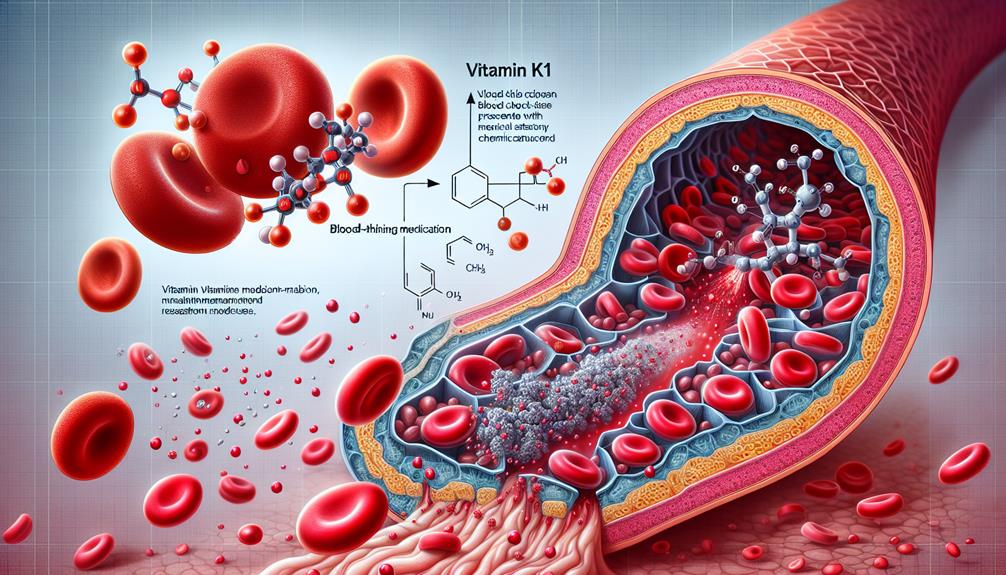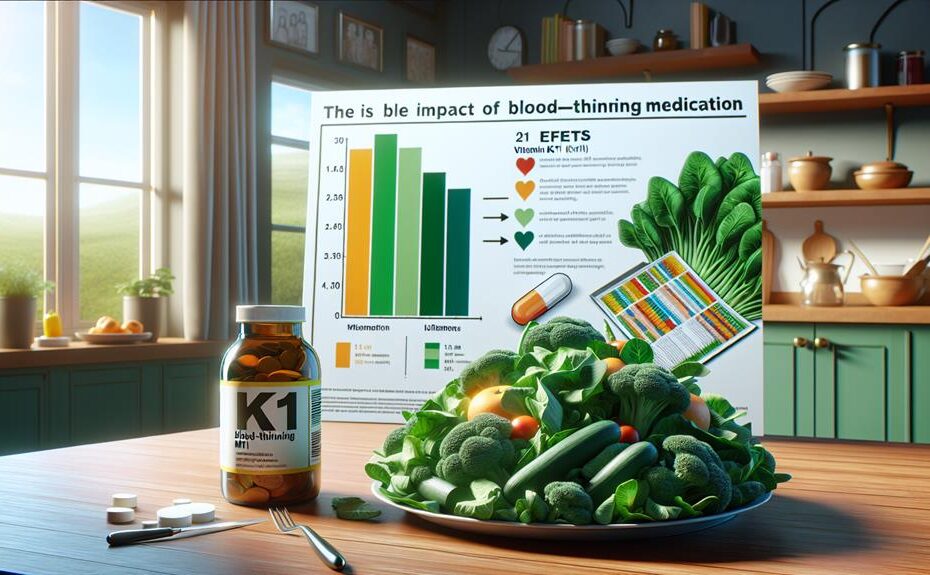







When you take blood-thinning meds, Vitamin K1 interactions are essential. Vitamin K1 helps clotting, but blood thinners prevent clots by affecting clotting factors. Fluctuations in Vitamin K1 levels impact how well blood thinners work. Too much Vitamin K1 can lessen the effect of blood thinners. Balance is key for adjusting dosages effectively and preventing complications. Green leafy veggies are rich in Vitamin K1, but absorption is influenced by fats. Maintain a balanced diet rich in Vitamin K1 while monitoring intake closely. Consistent communication with healthcare providers is crucial for managing interactions effectively. Understanding these interactions is crucial for your health.
Key Takeaways
- Vitamin K1 counteracts blood thinners by synthesizing clotting factors.
- Fluctuations in Vitamin K1 levels can affect blood thinners' effectiveness.
- Excessive Vitamin K1 intake can reduce the activity of anticoagulants.
- Understanding the balance is crucial for adjusting medication dosages effectively.
- Monitoring Vitamin K intake helps manage interactions with blood-thinning medications.
Importance of Vitamin K1
Vitamin K1 plays an essential role in the body's blood clotting process, ensuring wounds can heal properly and prevent excessive bleeding. It is important for the synthesis of clotting factors in the liver, specifically Factors II, VII, IX, and X. These proteins are crucial for the coagulation cascade, which stops bleeding when you get injured. Additionally, Vitamin K1 has benefits beyond blood clotting. Research suggests it may help maintain bone health by supporting the production of osteocalcin, a protein essential for bone mineralization.
When it comes to absorption efficiency, Vitamin K1 is best absorbed when consumed with dietary fats since it is a fat-soluble vitamin. Pairing Vitamin K1-rich foods like leafy greens, broccoli, and Brussels sprouts with healthy fats like olive oil or nuts can enhance its absorption. However, certain factors can affect absorption, such as gastrointestinal conditions that impair fat absorption or the use of medications that interfere with Vitamin K1 metabolism.
Function of Blood-Thinning Medications
Blood-thinning medications, also known as anticoagulants, work by interfering with the body's blood clotting process. These medications are essential in preventing the formation of blood clots that could lead to serious health issues like strokes or heart attacks. By targeting different components of the blood clotting cascade, anticoagulants such as warfarin, heparin, and newer oral anticoagulants like dabigatran and rivaroxaban help to inhibit clot formation and promote blood flow within the blood vessels.
Anticoagulant therapy plays a critical role in managing conditions such as atrial fibrillation, deep vein thrombosis, and pulmonary embolism, where there is an increased risk of abnormal blood clot formation. These medications help maintain blood viscosity within a therapeutic range, balancing the prevention of excessive bleeding with the necessary prevention of clot formation. Understanding the function of blood-thinning medications is essential for healthcare providers to tailor treatment plans to individual patients' needs and reduce the risk of complications associated with abnormal blood clotting.
Mechanism of Interaction

Understanding how Vitamin K1 interacts with blood-thinning medications is important in optimizing treatment effectiveness and minimizing potential complications. Drug interactions between Vitamin K1 and blood thinners occur primarily due to their impact on the coagulation cascade. Vitamin K1 plays a pivotal role in synthesizing clotting factors in the liver, such as factors II, VII, IX, and X. Blood-thinning medications, like warfarin, work by inhibiting the activity of these clotting factors. When Vitamin K1 levels fluctuate, either through dietary changes or supplementation, it can affect the effectiveness of blood thinners.
Moreover, excessive Vitamin K1 intake can antagonize the effects of blood thinners, leading to reduced anticoagulant activity and potential clot formation. Conversely, a sudden drop in Vitamin K1 levels can increase the risk of bleeding due to insufficient clotting factor production. Understanding the delicate balance between Vitamin K1 and blood-thinning medications is crucial for healthcare providers to adjust dosages effectively and ensure optimal patient outcomes. By monitoring and managing these drug interactions, healthcare professionals can help patients achieve the desired anticoagulant effects while minimizing risks of bleeding or clotting complications.
Impact on Clotting Factors
The impact on clotting factors is significant in determining the efficacy of treatment with blood-thinning medications and Vitamin K1. Clotting regulation is a complex process involving various factors, including Vitamin K-dependent clotting factors (II, VII, IX, X) synthesized in the liver. Vitamin K1 plays a vital role in activating these clotting factors, promoting their ability to form blood clots when needed.
When individuals are prescribed blood-thinning medications like warfarin or other anticoagulants, the goal is to inhibit the clotting process and prevent the formation of harmful blood clots. These medications work by interfering with the activity of Vitamin K in the liver, thereby reducing the production of clotting factors. However, Vitamin K1 supplementation can counteract the anticoagulant effects of these medications by enhancing the synthesis of clotting factors, potentially leading to reduced effectiveness of the treatment.
Understanding the delicate balance between Vitamin K1, clotting factors, and anticoagulant medications is essential for healthcare providers to tailor treatment plans effectively and minimize the risk of complications related to clotting abnormalities.
Dietary Sources of Vitamin K1

Dietary sources of Vitamin K1 include a variety of green leafy vegetables, such as kale, spinach, and broccoli, which are rich in this essential nutrient necessary for clotting factor synthesis. Vitamin K1 absorption from these foods is vital for maintaining adequate levels for proper blood clotting. Apart from leafy greens, other sources like Brussels sprouts, cabbage, and parsley also provide significant amounts of Vitamin K1. It's noteworthy that the absorption of Vitamin K1 can be influenced by various factors, including the presence of dietary fats which enhance its uptake.
Nutrient interactions play a key role in how well Vitamin K1 is utilized by the body. For example, certain medications or medical conditions can interfere with the absorption or utilization of Vitamin K1, potentially impacting its effectiveness in supporting clotting factor synthesis. By incorporating a balanced diet rich in Vitamin K1 sources, you can help make sure that your body receives an ample supply of this essential nutrient for maintaining healthy blood clotting functions.
Monitoring Vitamin K Intake
To ensure proper Vitamin K intake, it is essential to track your daily consumption of foods rich in this vital nutrient. Maintaining a balance in your nutrient intake is key to supporting overall health and ensuring medication efficacy. By monitoring your Vitamin K consumption, you can better manage any potential interactions with blood-thinning medications.
Keeping a food diary can help you keep track of the Vitamin K content in your meals. This way, you can be mindful of your dietary restrictions and make informed decisions about your health outcomes. Remember that Vitamin K is found in various foods like leafy greens, broccoli, and certain oils. Being aware of the Vitamin K levels in these foods can assist you in maintaining a consistent intake and avoiding sudden spikes that may affect your medication.
Strategies for Managing Interactions

Take into account incorporating vitamin K-rich foods strategically into your daily diet to mitigate potential interactions with blood-thinning medications. When consuming vitamin K1-rich foods, consistency is crucial. Try to maintain a steady intake of these foods, as sudden increases or decreases can impact the INR levels in your blood, which is used to monitor the effectiveness of blood thinners. Dosing adjustments may be necessary if you make notable changes to your vitamin K intake. It is vital to consult your healthcare provider before making any drastic changes.
Supplement compatibility is another aspect to take into consideration. If you are taking vitamin K supplements along with blood thinners, inform your healthcare provider. They can advise you on the appropriate dosages and potential interactions. Your healthcare provider may need to monitor your blood levels more closely to make sure that the combination of vitamin K supplements and blood thinners is safe and effective for you.
Consultation With Healthcare Providers
When overseeing interactions with blood-thinning medications, make sure to engage in open communication and seek guidance from your healthcare provider regarding the incorporation of vitamin K-rich foods and supplements. Healthcare communication is crucial for understanding how vitamin K1 may affect your medication regimen. Your healthcare provider can conduct a risk assessment to determine the potential impact of vitamin K1 on your blood-thinning medication. Through patient education, your provider can explain the importance of maintaining a consistent intake of vitamin K1 and help you make informed decisions about medication adjustments if necessary. Consulting with your healthcare provider allows for personalized recommendations based on your specific health needs and ensures that you are receiving accurate information tailored to your situation. By discussing any concerns or questions about vitamin K1 and blood-thinning medications with your healthcare provider, you can work together to develop a detailed plan that promotes your overall well-being.




